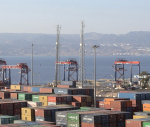You are here
Palestinians and Saudi Arabia
Nov 21,2018 - Last updated at Nov 21,2018
Palestinian citizens of Israel often find themselves caught between a rock and a hard place. On the one hand, they feel discriminated against by the ruling Jewish Israeli powers, and at the same time they are often misunderstood and not accepted by fellow Arabs and Muslims. Israel’s recent nation-state law declared that citizens of Israel of the Jewish faith have special rights and privileges, including the right to self-determination, while non-Jews, who constitute nearly 20 per cent of the population, do not have that right, nor does the Arab language, that has been considered an official language for years, hold that title anymore.
For decades, Palestinians living in Israel had an image problem whenever they travelled or met other Arabs or Muslims, who somehow considered them traitors for carrying an Israeli passport and choosing to remain living under Israeli rule. And as they often tell their detractors, Israel came to them; they did not go to Israel. But regardless of who came to whom, it took Palestinian patriotic leaders and their nationalist leaders many years before they succeeded to a large degree in erasing this negative mark associated with Palestinians living in Israel.
Among the major drawbacks of staying put in their homes when most others fled was the fact that they were not allowed to visit relatives and friends in Arab countries technically at war with Israel. The problem was even worse for Muslim Palestinians, who were citizens of Israel and who were unable to perform the mandatory Hajj pilgrimage and the non-mandatory umra visits to Saudi holy places during the time outside of the Hajj season.
The Hajj problem was resolved in 1978, when His Majesty the late King Hussein suggested that Jordan provide Muslim citizens of Israel with temporary Jordanian passports. The idea was presented officially at the Arab League, and with the approval of the Saudi government and the Arab League, Jordan started facilitating the ability of tens of thousands of Muslims citizens of Israel to carry out their religious duties.
Temporary passports were not limited to Muslims of Israel. While Palestinians of the West Bank, including Jerusalem, were allowed also to possess Jordanian passports as part of Jordan’s 1950 decision to annex the West Bank, this decision was partially retracted in 1988. When Jordan severed legal ties with the West Bank, Palestinians could continue to possess Jordanian passports but they no longer had citizenship, as reflected by not having a national ID number listed on their passports. For most Palestinians, this problem was short-lived because after the Oslo Accords they were granted Palestinian passports. The only group that was left in legal limbo was the Palestinians of Jerusalem, as well as several Palestinians from Gaza, who immigrated to Jordan and were not given citizenship.
Those Palestinians, Israeli citizens, Jerusalem residents and Gazans living in Jordan, continued until recently to be able to travel to Saudi Arabia not only for the annual Hajj pilgrimage, but also for umra and to apply for work in Saudi Arabia.
However, after this year’s Hajj season, Saudi Arabia unilaterally changed its policy. Tour agents who organise religious visits to Saudi Arabia were the first to be informed that no visas will be issued to any person who is not a citizen with a national ID number. This decision did not only affect nearly 2 million Palestinians in Jerusalem and Israel, but also Palestinians with no citizenship in Jordan, Syria, Egypt and Lebanon. Palestinian refugees in these countries carry travel documents from the countries they are residing in, even though they have not been granted citizenship.
It is not clear what pushed Saudi Arabia to this unusual decision. Most Palestinians believe that this was an unannounced part of the plan of US President Donald Trump’s administration to end the Palestinian refugee problem and to take Jerusalem off the table. Hundreds of travel companies in Israel, Jerusalem and Jordan suddenly were out of work this fall, and rumours began to circulate that Saudi Arabia might even change its policy regarding dealing with Israeli citizens.
Rumours have been circulating within Palestinian circles in Israel that the Saudi government might be open to allowing Palestinians living in Israel to enter on Israeli passports and to fly directly from Ben Gurion Airport to Saudi Arabia. Trump's team have been talking publicly about the need to end the recognition of Palestinian refugees. And while the US has not yet officially recognised the annexation of Jerusalem and has not suggested that Palestinians in Jerusalem apply for Israeli citizenship, the move of the US embassy to Jerusalem appears to suggest a warming up to this position.
The Jordanian ministries of foreign affairs and awqaf and Islamic affairs attempted to reverse this policy, and delegations from both ministries had travelled to Saudi Arabia to find a solution to this problem that affects millions of Palestinians.
Saudi King Salman made a strong speech at the Shura Council in support of the Palestinian cause. Many saw in that speech a sign that the decision disenfranchising millions of Palestinians from religious visits and work in Saudi Arab will be soon reversed. The support that Saudi Arabia has consistently given to Palestinians indicate that this dark cloud over many Palestinians will soon be lifted.













